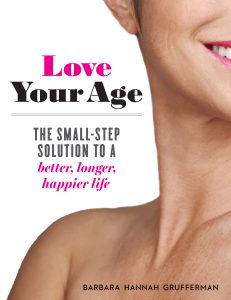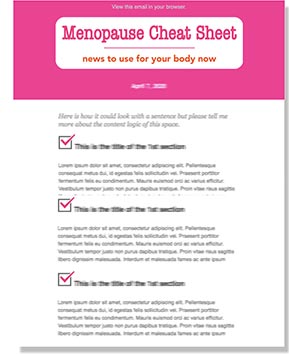Recently, a highly regarded menopause organization invited me to give my opinion about the difference between how the U.S. handles menopause — especially in the workforce — compared with the U.K.
Here’s my OpEd piece. Please read and let me know if you agree or disagree with my assessment.
Rebranding Menopause: What America Can Learn from the UK.

WHAT CAN THE UK TEACH THE US ABOUT MENOPAUSE?
Barbara Hannah Grufferman, author and native New Yorker is a recognised expert and vocal supporter of positive and healthy ageing in the United States. A well-known pundit across US television and radio stations, she’s dismayed by the lack of support available to American women on the hot topic of menopause. She’s been following the menopause movement in the UK and she’s impressed with what she sees. What does she think the UK can teach the US about talking, rebranding and managing menopause?

Reality check: so many of us live in weird denial about something that not only profoundly and permanently affects the bodies – inside and out, head to toe – of more than half the world’s population, but at the same time has a tremendous impact on, well . . . just about everyone.
Menopause is as much a part of the human experience as is being born, and not just for those who experience it first-hand – which is almost all women – but for those who love them, work with them, marry them, are mothered by them, and everyone in between.
Menopause has stayed in the shadows in America. No one really likes to talk about it for two very critical reasons: 1) society has directly connected menopause to ageing, and no one ever wants to talk about ageing; and 2) it’s a woman thing (oh, dear God, if men experienced menopause . . . )

Result? In the US, there is a dearth of good resources available to women and we’re woefully lacking in support for those who are experiencing menopause in a way that truly compromises their quality of life.
I was one of the lucky few; my foray into menopause was relatively easy. Sure, there were sleepless and sweaty nights, mood swings and hot flashes, but they were mild and I seemed to enter menopause and pull out of it rather quickly and without a lot of fanfare. But, that’s not the case for so many women.
There’s a shroud of mystery surrounding menopause that leaves women feeling isolated and confused, but also causes the people in their lives to be left in the dark about what they are experiencing. This is so wrong on so many levels. Isn’t it time for everyone of every age to understand, embrace, appreciate, respect, and most importantly normalise menopause? By continuing to ignore it, or worse, view it as a medical illness that must be cured instead of a critical and natural part of life, we continue to diminish the importance and value menopause has in our experience as humans.
The good news is that the United Kingdom gets it. This year alone I have seen reports from the UK about companies creating positions called “Menopause Champions” and rooms being put aside for women to relax and try to gain equilibrium after a particularly steamy hot flash. From what I can see, there are more organisations in the UK geared to women’s health and menopause than there are in the US, where menopause continues to be something better left off the list of dinner table topics. And there just seems to be more of a push to get partners, co-workers, children and everyone else more in touch and in tune with the whole idea of menopause in the UK, than in the US.
Clearly, there is a lot we in America can learn from our good friends in the UK about helping women weather the menopause storm, but more importantly, how to rebrand menopause from a condition that is better left ignored to a normal experience for all women.
But, it isn’t only the temporary (although very annoying) symptoms of menopause that have really captured my attention. It’s the deep changes that are most important: what happens to our brains, hearts, bones? What affect does menopause – and the drop in estrogen that causes menopause – have on our sexual lives? Say the word “menopause” and most people think “hot flash”. Not me. I have taken the deep dive into menopause and I know how deeply we are affected by it.
Even though the UK is light years ahead of the US with regards to menopause, there’s still a lot of work to be done for both countries. For starters, we need to reach out to younger women so they take proactive steps to protect their brains, bones, hearts and everything else that menopause touches; and to men, so they aren’t intimidated and embarrassed by one of life’s absolutes; and of course, to women, who might not understand the true depths of the changes that menopause will bring to every inch of their bodies for the rest of their lives.
________________________________________________________
Looking for science-backed information and tips on how to age successfully? Check out my latest book — “Love Your Age: The Small-Step Solution to a Better, Longer, Happier Life” — available right here on Amazon.


































































One comment